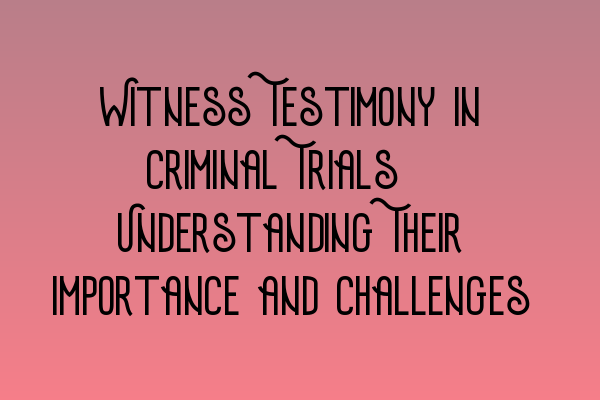Witness Testimony in Criminal Trials: Understanding Their Importance and Challenges
When it comes to criminal trials, witness testimony serves as a crucial component of the legal process. Witnesses provide firsthand accounts of the events surrounding a crime, shedding light on the truth and aiding in the pursuit of justice. However, relying on witness testimony can pose various challenges that must be carefully navigated to ensure a fair and accurate trial.
The Importance of Witness Testimony
Witness testimony is often considered the backbone of a criminal trial. It provides the court with critical information that can either support or challenge the prosecution’s case. Witnesses play a vital role in establishing the credibility of the parties involved and can significantly sway the outcome of a trial.
By hearing a witness’s account of the events, the jury or judge can gain valuable insights and make informed decisions based on the evidence presented. Witness testimony can corroborate or refute other pieces of evidence, such as forensic analysis or surveillance footage. It helps establish a comprehensive narrative of the crime, aiding the court in reaching a fair verdict.
Furthermore, witness testimony humanizes the legal process by bringing real individuals into the courtroom. Their presence and willingness to share their experiences can make a lasting impact on the jury, fostering empathy, and ensuring that justice is served.
Challenges in Witness Testimony
While witness testimony is invaluable, it is not without its challenges. One significant challenge is the reliability of witness memory. Memory can be fallible, and people’s recollections can be influenced by various factors, such as stress, time, and leading questions. Witness credibility may also be called into question based on their relationship to the defendant or potential biases they may hold.
Another challenge arises when witnesses are reluctant to come forward or testify due to fear, intimidation, or other personal reasons. In such cases, it becomes essential to create a safe and supportive environment for witnesses, ensuring their cooperation and willingness to share their testimony.
Additionally, witnesses may face difficulties in accurately interpreting and recounting complex or traumatic events. The emotional impact of a crime can distort memories and affect a witness’s ability to provide a coherent and consistent account of what transpired.
Overcoming Challenges and Ensuring Fair Trials
Recognizing the challenges associated with witness testimony, the legal system employs various strategies to mitigate these difficulties and ensure fair trials:
- Cross-Examination: During cross-examination, the defense has the opportunity to question the witness, challenging their credibility, memory, and biases. This process helps expose any inconsistencies or weaknesses in the testimony.
- Expert Witnesses: Sometimes, the complexity of a case requires expert testimony to provide additional context or interpretation of the evidence presented. Expert witnesses can help clarify technical information and guide the court in understanding the facts.
- Demystifying the Solicitors Qualifying Examination Format
- LLC Formation Made Simple: Step-by-Step Guide for UK Entrepreneurs
- LLC Formation: A Step-by-Step Guide for UK Entrepreneurs
- Business Regulations in the UK: A Comprehensive Overview
- Decoding Corporate Structures: A Comprehensive Legal Insight
By utilizing these mechanisms, the legal system strives to uncover the truth while protecting the rights of all parties involved. It ensures that witnesses are given the opportunity to present their account while subjecting that testimony to critical examination to test its veracity.
Conclusion
Witness testimony plays a vital role in criminal trials, helping establish the facts, providing firsthand accounts, and aiding in the pursuit of justice. While challenges such as memory reliability and witness reluctance exist, the legal system employs various strategies to overcome these obstacles.
Ultimately, a fair and accurate trial requires careful consideration of witness testimony. By understanding its importance and the challenges it presents, legal professionals can ensure that justice is served, and the truth prevails.
